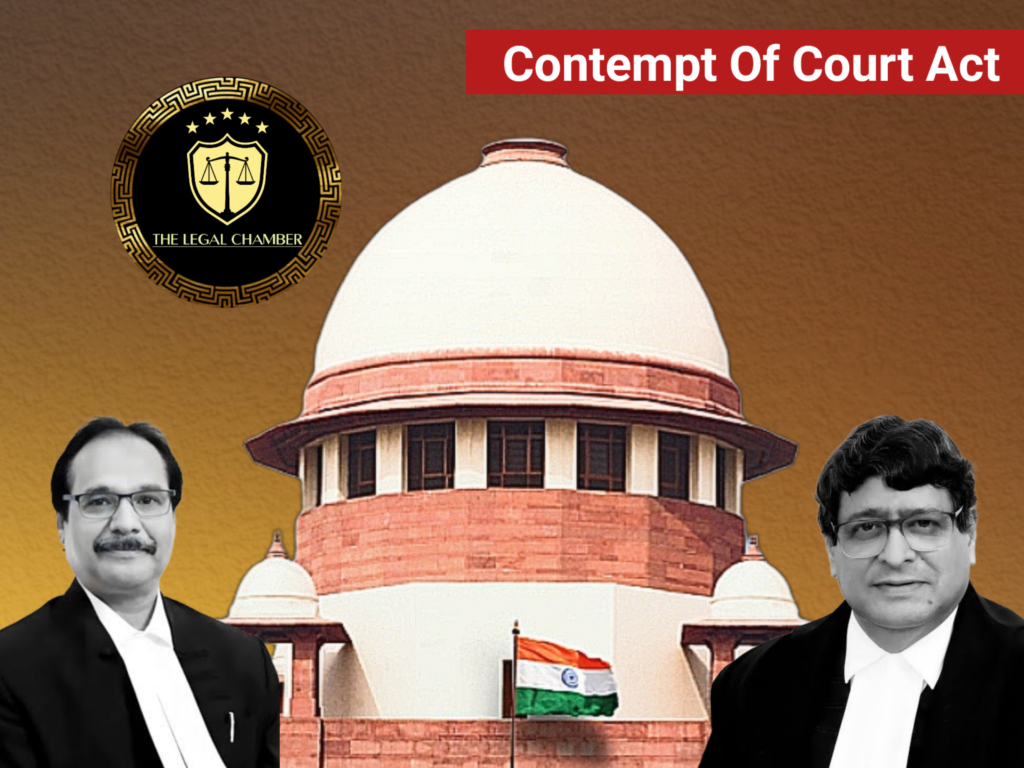
The Supreme Court upheld the conviction of the appellants under the Contempt of Courts Act, 1971, for fabricating and submitting fake High Court orders to obstruct court proceedings. Rejecting the plea of limitation under Section 20, the Court ruled that contempt proceedings were validly initiated within one year. However, it reduced the sentence from six months to one month, emphasizing that forgery of judicial records undermines the administration of justice. The Court clarified that strict proof is required in contempt cases but found the charges proven beyond doubt.
Facts Of The Case:
The case originated from a property dispute where the District Munsiff Court, Tiruchengode, passed a decree in 2004 in favor of J.K.K. Rangammal Charitable Trust, ordering the eviction of the contemnors (appellants) and recovery of rent arrears. When the court bailiff attempted to execute the decree in 2018, the contemnors produced purported interim stay orders from the Madras High Court in CRP Nos. 1467-1469 of 2018. However, investigations revealed these orders were forged—no such petitions were filed, and the judge named in the fake orders was not handling CRP matters on the mentioned date. The Trust filed complaints, leading to an FIR for forgery (Sections 466, 468, 471 IPC) and a writ petition seeking contempt action.
The Madras High Court, after tracing a missing case file, initiated suo motu contempt proceedings in 2022. It convicted the appellants for fabricating court orders to obstruct justice, sentencing them to six months’ imprisonment. On appeal, the Supreme Court affirmed the conviction, rejecting arguments on limitation and procedural lapses, but reduced the sentence to one month, noting the gravity of undermining judicial authority through forged documents. The Court emphasized that such acts strike at the heart of the justice delivery system.
Procedural History:
The procedural history of the case began with the execution of a 2004 decree by the District Munsiff Court, Tiruchengode, which was obstructed in 2018 when the contemnors produced forged High Court stay orders. The decree holder filed a complaint, leading to an FIR and a writ petition (W.P. No. 22410 of 2018) before the Madras High Court, seeking contempt action. On September 5, 2018, the Single Judge directed the matter to be placed before a Division Bench for contempt proceedings under the Contempt of Courts Act, 1971. Due to administrative delays, including a missing case file, the contempt petition was formally numbered in 2022 (Contempt Petition No. 2493 of 2022).
The High Court framed charges against the contemnors, convicted them, and sentenced them to six months’ imprisonment. On appeal, the Supreme Court admitted the case (Criminal Appeal Nos. 5245 of 2024, 4219 of 2024, and Diary No. 45480 of 2024), upheld the conviction, but reduced the sentence to one month, emphasizing the gravity of forging judicial documents while considering procedural fairness. The Court also clarified that the initiation of contempt proceedings was within the limitation period under Section 20 of the Act.
Court Observation:
The Supreme Court made several key observations in its judgment. Firstly, it emphasized that forging court orders constitutes a grave form of contempt as it directly undermines the administration of justice and erodes public trust in the judiciary. The Court rejected the limitation argument under Section 20 of the Contempt of Courts Act, 1971, holding that proceedings were validly initiated when the Single Judge referred the matter to the Division Bench in 2018, well within the one-year limitation period from the date of contempt (April 2018).
The Court clarified that while contempt proceedings are quasi-criminal in nature, requiring proof beyond reasonable doubt, the standard was met in this case through overwhelming evidence including police reports, forensic analysis, and the contemnors’ own admissions. It noted that utilizing fabricated court orders, even if not personally created, amounts to contempt as it interferes with judicial proceedings.
Regarding sentencing, the Court observed that while such serious contempt warrants deterrent punishment, the six-month sentence imposed by the High Court was excessive considering the circumstances. It reduced the term to one month, balancing the need to uphold judicial authority with principles of proportionality. The judgment reaffirmed courts’ constitutional duty under Articles 129 and 215 to protect the sanctity of judicial processes from fraudulent interference.
Final Decision & Judgement:
The Supreme Court, in its final judgment, dismissed the appeals and upheld the Madras High Court’s conviction of the appellants under the Contempt of Courts Act, 1971. While affirming the finding of guilt for fabricating and submitting forged court orders to obstruct justice, the Court modified the sentence, reducing the imprisonment term from six months to one month. The bench emphasized that while the offense was serious enough to warrant custodial punishment, the reduced sentence better served the ends of justice under the circumstances. The Court directed the appellants to surrender before the Madras High Court Registrar within 15 days to serve their modified sentence. This decision reaffirmed the judiciary’s zero-tolerance approach towards any manipulation of court processes while demonstrating a balanced application of punitive measures. The Registrar (Judicial) of the Supreme Court was instructed to communicate the order to the concerned High Court for compliance.
Case Details:
Case Title: Shanmugam @ Lakshminarayanan & Others vs. High Court of Madras Citation: 2025 INSC 619 Criminal Appeal No(s): Criminal Appeal No. 5245 of 2024 (Shanmugam @ Lakshminarayanan), Criminal Appeal No. 4219 of 2024 (M. Muruganandam), Criminal Appeal Diary No. 45480 of 2024 (S. Amal Raj) Date of Judgment: May 2, 2025 Judges/Justice Name: Justice Prashant Kumar Mishra (Author of the Judgment)& Justice Sudhanshu Dhulia